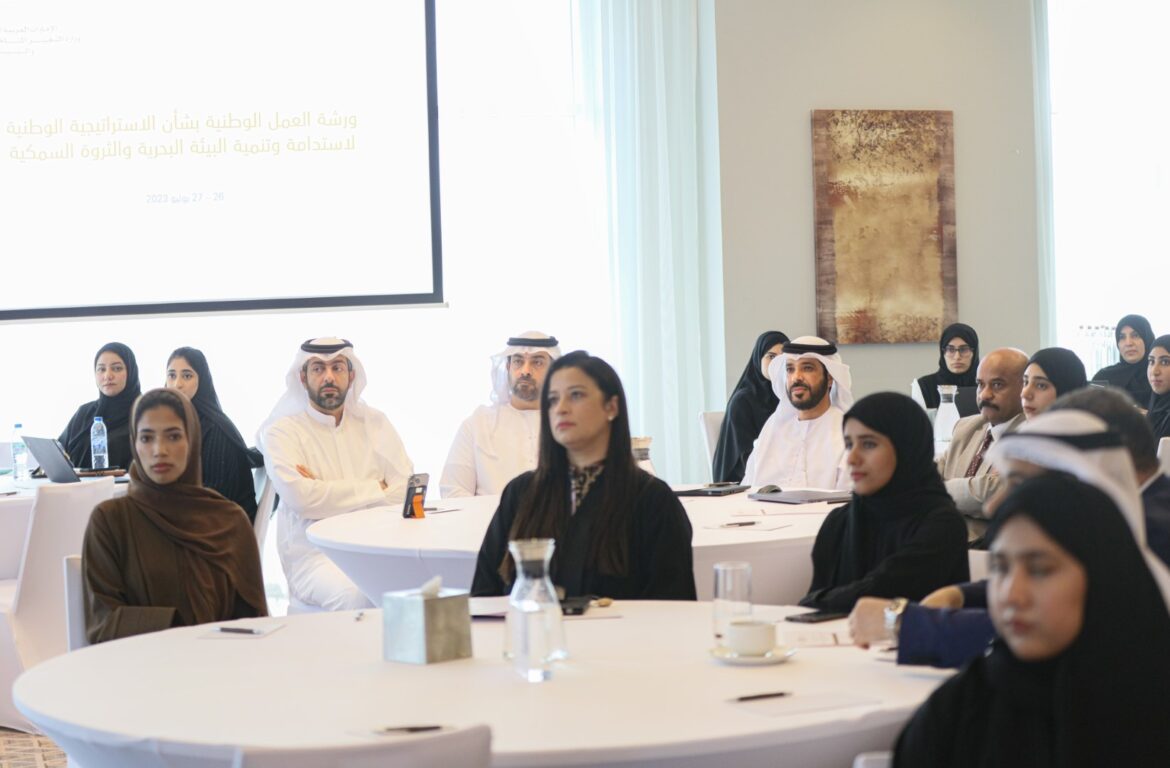As part of the Year of Sustainability and in preparation for the 28th Conference of the Parties (COP28), the UAE Ministry of Climate Change and Environment concluded a workshop to develop the national strategy for the sustainability of the marine environment and fisheries. The aim is to review national efforts to protect and manage the marine environment and fisheries, including aquaculture, in addition to developing future programs and projects and identifying the main challenges and opportunities available to enhance the sustainable development of marine ecosystems and living water resources, leading to the identification of a shared national vision and key strategic guidelines for the period 2024–2030.
His Excellency Dr. Mohammed Salman Al Hammadi, Assistant Undersecretary for the Biodiversity and Marine Life Sector at the Ministry of Climate Change and Environment, opened the two-day workshop. The workshop saw broad participation from more than 40 participants from municipalities, specialised environmental bodies, federal and local government departments, universities, port authorities, and a large number of scientific experts in environmental and marine sciences, scientists, and researchers.
The participating entities included the Ministry of Defence, Abu Dhabi Agriculture and Food Safety Authority, Environment Agency -Abu Dhabi, Dubai Municipality, Fujairah Environment Authority, Abu Dhabi Ports, Ajman Municipality and Planning Department, Sharjah Fisheries Authority, Ras Al Khaimah Environment Protection and Development Authority, Umm Al Quwain Municipality, Abu Dhabi National Oil Company (ADNOC), UAE University, and the National Space Science and Technology Center.
The workshop aimed to identify the national efforts led by the Ministry of Climate Change and Environment in the field of management and protection of marine and coastal ecosystems in the UAE, evaluate the current status of the marine environment and various initiatives and projects in this regard, identify the most important existing and future challenges and opportunities, to enhance sustainable development and conserve the marine environment and its wealth, and lead to the identification of a shared prospective national vision that is in harmony with the state’s environmental policies.
In his opening speech at the workshop, His Excellency Dr Mohammed Al Hammadi said: “The concerted national efforts based on constructive cooperation with our strategic partners from specialised environmental entities and relevant federal and local government departments and the private sector will have a great impact in developing the national strategy for the sustainability of the marine environment and fisheries, and effectively contributing to the development and enhancement of the protection of marine resources in the UAE and ensuring their sustainability.”
His Excellency Al Hammadi stated that the United Arab Emirates plays a pivotal and active role in preserving the marine environment and fisheries, noting that: “In order to preserve our national marine wealth and work on its sustainability, we seek through the workshop to evaluate the current situation regarding the management of marine and coastal ecosystems, within a comprehensive framework that includes environmental, economic, social, and regulatory aspects.”
He added: “Based on an analysis of strengths, weaknesses, and available opportunities, a strategic framework will be developed from a future vision and key guidelines that respond to the challenges facing the marine environment and fisheries and global trends for the governance of marine ecosystem management. Its goals are to rely on developmental economic patterns with high added value, considering the marine environment’s specificity and fragility and the challenges of preserving the marine environment and fisheries.”
Multiple initiatives and projects
Workshop attendees engaged in discussions around the National Strategy for the Sustainability of the Marine Environment and Fisheries 2024-2030. They examined the Ministry of Climate Change and Environment’s efforts, along with those of other participating entities, in maintaining the sustainability of the marine environment and fisheries. This included a review of the numerous initiatives and projects the Ministry has initiated, spanning marine environmental research, studies, and marine habitat rehabilitation projects.
Participants also discussed developing a national plan to combat marine pollutants, establishing a national framework for sustainable fisheries, and introducing legislation to address changes in fish stock status, climate change impacts, and human activities. The discussions also touched on strategies to mitigate the effects of pollutants originating from terrestrial and marine sources.
Further discussions were held on other key strategic directions and initiatives. These primarily focused on the sustainability of marine and coastal environments, the preservation of living aquatic resources, and the collation of relevant statistics and data. They also explored research initiatives and the enhancement of national capacities related to the strategy’s objectives.



